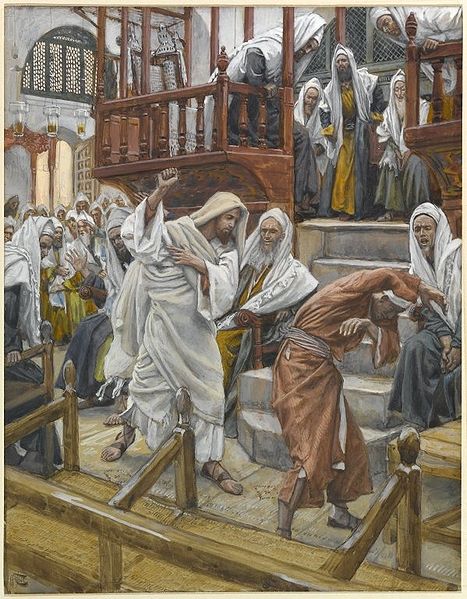
4th Sunday in Ordinary Time B
Readings:Deuteronomy18:15-20
1 Corinthians 7:32-35 Mark 1:21-28
“What does this mean? A completely new teaching in a spirit of authority! He gives orders to unclean spirits and they obey him!” This reaction to Jesus’ first miracle in Mark presents us with the mystery, authority and power of the kingdom of God as it is manifest in Jesus. In our cynical age, distrustful of political and even religious authorities, we strive to be open to the authoritative power of Jesus’ healing word. Let us be attentive to the words of today’s responsorial psalm: “If today you hear his voice, harden not your hearts” (Ps 95).
The Deuteronomy reading expresses Israel’s hopes for the continued presence of God’s authoritative word in the person of a prophetic successor to Moses. According to the account of the Lord’s appearance and giving of the covenant on Mount Horeb in Deuteronomy 5, the Israelites were frightened that they might die because they had heard the direct voice of the Lord and seen his glory in the great fire on the mountain (see Deut 5:1-5,22-27). In response to their reverential fear, the Lord establishes Moses as the mediator of his covenant demands (Deut 5:28-31). In our reading, Moses announces that his office will be continued after his death by a prophet who will speak God’s words to succeeding generations. In later Judaism this prophetic figure came to be understood as the Lord’s final, eschatological messenger who would arise on the great day of the Lord to initiate the process of purifying Israel (see Mal 3:1-5,22-24). In Mark’s Gospel John the Baptist begins to fulfill this role (Mark 1:2-8), and Jesus’ powerful ministry of teaching and healing brings it to completion.
In the seconding reading from First Corinthians, Paul continues his eschatological exhortations to both unmarried and married men and women. His advice is very even handed. Paul wants both groups “to be free of anxieties” by trusting completely in God and the risen Christ. The unmarried should not be “anxious about the things of the Lord” and how they “may please the Lord” or “be holy in body and spirit.” Likewise, the married should not be “anxious about the things of world” and how they “may please” their wives or husbands. Both groups must learn to serve “the Lord without distraction.”
In the Gospel Mark, after recounting Jesus initial proclamation of the Kingdom of God and the call of the first disciples at the Sea of Galilee, has him immediately take his mission into the physical and temporal center of the established religious order and assert his authority over the demonic forces that have entered there. Jesus and his disciples come to Capernaum, and on the Sabbath he enters the synagogue and teaches. The people are astonished at the authority of his teaching because it is “not like the scribes,” the traditional authorities in the synagogue. Then, in the midst of the synagogue, Jesus encounters the demonic powers of an unclean spirit which had possessed a man. In Mark’s Gospel Jesus’ ministry is presented as a titanic battle against the evil forces of Satan. It began with his struggle with Satan in the desert (Mark 1:12-12), and now in his first public teaching in the synagogue he again encounters Satan’s forces. With calm, authoritative power, Jesus rebukes the demons in the possessed man by simply commanding: “Quiet! Come out of him!”
An important theme throughout Mark is the mystery of Jesus’ identity. In today’s Gospel the supernatural demonic forces immediately recognize Jesus as their mortal enemy; they shriek: “What have you to do with us, Jesus of Nazareth? Have you come to destroy us? I know who you are–the Holy One of God!” In contrast, the crowds who witness Jesus’ exorcism are amazed, but are not able to fully comprehend his significance. “All were amazed and asked one another, ‘What is this? A new teaching with authority. He commands even the unclean spirits and they obey him.’” We, as Mark’s readers, are challenged to go beyond the crowds by accepting and following the authoritative Jesus, “the Holy One of God,” who attacks and defeats the demonic powers of evil, even in the bastions of religious and political privilege.


